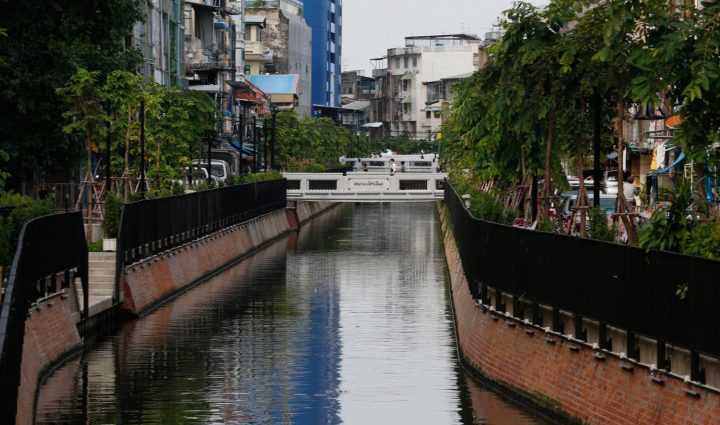
Despite winning the “2020 Asian Townscape Awards” after undergoing renovation for several years, Ong Ang Canal in Phra Nakhon district has received mixed reactions from locals and tourists.
According to the Bangkok Metropolitan Administration (BMA), Ong Ang Canal was last overhauled around 2019, including renovations to its walking street and artist-designed manhole covers.
After the walking street opened, the BMA collaborated with Urai Phanich Co. Ltd and ATM Spray in 2020 to have street art line the canal walls from Phanupan Bridge to Damrongsathit Bridge.
The graffiti murals were commissioned to reflect the character of the area in a contemporary style.
In 2021, the United Nations Human Settlement Programme (UN-Habitat) honoured the area with a “2020 Asian Townscape Award”.
The award “recognises the efforts of municipal administration, business operators, planners/designers, and citizens working together as a team” based on criteria such as environmental friendliness, sustainability, respect for local culture, artistic quality, and regional impact, according to UN-Habitat.
Despite the canal’s critically acclaimed status, the Bangkok Post found local sentiment on the makeover divided during a recent visit. Some called it a step forward but many others said it led to an increase in the cost of living in the area.
On the plus side
Ms Kwang, a coffee shop owner, said people have been coming in small numbers since the walking street opened but larger numbers are expected during upcoming festivals.
She added the fall in tourist numbers might be due to the ongoing impact of Covid-19.
“In the past, around four to five years ago, people came a lot, but after the pandemic, people have been quiet until the current recovery began, so people are gradually coming back,” she said.
“I think making it a tourist attraction has reduced litter and made the area cleaner, particularly the roads and footpaths.”
Narong Nilsuwatana, 75, who has lived near the canal for almost 60 years, said the area looks much better now.
“Since Prayut [Chan-o-cha] became prime minister, the area has improved. Before, it was crowded with hawkers, clogged with waste, and muddy,” he said.
“The environment was extremely hot and unpleasant at the time, but after removing Saphan Lek Bridge, it became much cooler,” he said.
Ms Duang, 67, who owns noodle shops in the area, said the slump in customers began even before the pandemic.
However, the return of the weekend market would hopefully improve things. The walking street will be open Friday to Sunday from 4pm to 8 pm.
On the negative side
Wittaya Wongwian, a 29-year-old contractor and frequent visitor to the canal, says he still remembers visiting the place for the first time 17 years ago.
Back then, there was a metal sheet covering the canal as they had built a market, which is why it was called “Saphan Lek” (iron bridge), he recalls.
The market sold games, PlayStation, pirated copies of movies, and DVD players.
“There were a lot of people when Saphan Lek was still here, but since the demolition in 2015 and further renovation to the Ong Ang Canal we know today, the place has gone quiet,” he said.
“It does not look as beautiful as advertised,” Mr Wittaya said. The only good thing left, according to him, is the Indian food around Thanon Phahurat.
Similarly, Thira Sakonphadungket, a 17-year-old student who has been visiting the canal for some time, said some people came during the Covid-19 outbreak two years ago, but their numbers were small. Now, the number of visitors has increased slightly.
Thira says the main reason for coming is the delicious Indian restaurants in the area.
Future plans
In late 2022, the government took steps to boost domestic tourism after Covid-19 eased.
The government opened the country in late 2021 and relaxed the screening process, leading to a slight increase in tourist numbers during the first half of 2022. Since then, the tourism industry has started to recover.
In the first half of last year, about 93 million Thai tourists returned, or about 40% of pre-pandemic numbers. However, international tourism is still down, with only around 2 million visitors returning, or about 5% of the pre-pandemic period, said a Bank of Thailand report.
This has prompted local authorities to seek ways to attract more visitors. Back in late December 2021, Aekwaranyu Amrapal, the BMA spokesman, announced that Ong Ang Canal would be transformed into a “creative business area.”
However, the lack of a clear identity stalled the project, as did the failure of various sectors to cooperate, which is crucial for the development of the area.
In 2022, the BMA tried to work with locals to organise a Diwali festival, which was a success.
As a result, the Ong Ang Canal project became more of a “word of mouth” concept for a while, and the BMA plans to carry on with this initiative in the future, said Mr Aekwaranyu.

